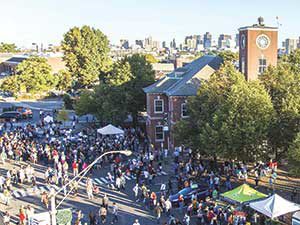
Many of Union Square’s major stakeholders are finding it difficult to agree on the best way to approach finalization of the Community Benefits Ordinance.
By Jordan Deschenes
Although city officials have stressed that the Community Benefits Ordinance (CBO) is not meant to be exclusive to one area, residents and business owners in Union Square have become aware of the implications that the legislation will have on their neighborhood’s prosperity in the coming years. With official talks about the ordinance set to resume in early September, Union Square’s major stakeholders are still wary of the best way to draft it.
“I think the ordinance that has been drafted is deficient in getting adequate participation on the part of various stakeholders,” said Bill Cavellini, a member of the Union United steering committee.
When passed, the CBO will dictate how community benefits funds are prioritized and distributed throughout the city. As the ordinance is currently drafted, Cavellini believes that the Community Benefits Committee (CBC) – the appointed body that initially approves or rejects community benefits funding requests – does not give individual neighborhood councils enough of an influence on the final decision.
Cavellini further commented on the fact that the Mayor and the Board of Aldermen would have the final say in approving community benefits funding requests.
“The neighborhood council gets to make recommendations to this appointed body – the CBC – which was formed by another appointed body. How democratic is that?” Cavellini asked.
Unlike Neighborhood Councils, the CBC would not hold public elections for nominations to serve.
While city officials and Union Square stakeholders are unsure of the exact role of newly formed Neighborhood Councils, both are in agreement that they should represent the interests of highly developed commercial areas of the city and their surrounding neighborhoods.
Cavellini in particular suggested that there be several private neighborhood councils citywide, each with the ability to negotiate on its own behalf with the CBC.
According to Esther Hanig, Executive Director of Union Square Main Streets, the function of neighborhood councils has been subject to change over the course of the CBO drafting process. In an interview, Hanig revealed that the councils were originally intended as a single place-making organization.
“I think that this is going to be very challenging and I don’t think there will be any easy answers to this issue,” said Hanig, referring to the indecision she had experienced on the issue in past meetings.
“If the Neighborhood Council was wanting to provide specific services as well as be a negotiator and policy-body, then they would have to be a private entity,” Hanig continued, adding that she was still noncommittal about supporting a solely private or public decision.
The most recent interim bylaws put forth by the Union Square Neighborhood Council call for a fifteen member Founding Board that will carry out the council’s responsibilities in the first year. During this time, the Founding Board will also conduct a study and submit a final report regarding which form of incorporation (private or public) for the Neighborhood Council is appropriate in relation to the CBC.
In a formal statement, Greg Karczewski, president of US2, praised the hands-on efforts of the Union Square community throughout the process, although he believes that the neighborhood councils’ legal status decision should be a collaborative effort with the BOA.
“Given how committed residents, business owners, and stakeholders have been to shaping the process of what is built in Union Square, it would be great to see the same diversity and inclusiveness in whatever form the Neighborhood Council takes,” wrote Karczewski.
When considering their positions on how the city should approach the CBO and Neighborhood Councils, Cavellini and Hanig stated that they ideally want to ensure that residents and businesses alike are adequately represented in the community benefits distribution process.
In addition to backing existing businesses to help them thrive in the new marketplace, Hanig and Cavellini also voiced support for school-business partnerships and job training programs to prepare residents for the new occupations that will become available with new commercial development. Currently, close to 85% of Somerville residents commute outside of the city for work.
“We desperately need, as a city, more jobs and people who are able to fill these jobs,” said Hanig.
Cavellini stressed the importance of major contracts that the city secured with clients such as those in the biotechnological field, pointing out the industry’s relatively high tax base. He further explained that valuable business clients would bring more opportunity to Somerville’s school system to prepare students with specialized skillsets.
“That’s one of the things that can be gained through a Community Benefits Agreement that can’t be gained through zoning, for instance, the process we already went through for Union Square,” said Cavellini.
“Each neighborhood council should be in a position to negotiate that (CBA) with a developer, like US2.”












Job-specific training is a waste of time. The workplace changes so rapidly that if your skills are too specific, you become obsolete. I’m all for people learning to become machinists or coders, but making that a central ask in a community benefits agreement seems like a small bang for the buck.
I’d much rather see a higher percentage of locally owned and operated retail, a greater diversity of housing and money toward infrastructure. Those are the kinds of things that will benefit the community in the long run. Jobs training for manufacturers who may never even locate in Somerville, let alone Union Square, is little more than a show pony.